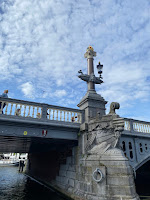After spending three days in Amsterdam, both L. and I have finally learned that “coffee shop” doesn’t mean a cafe, but a place where you’re served cannabis (in whatever form you fancy): there won’t be coffee. If you DO want coffee, you need to proceed to a *real* cafe (cannabis wouldn’t be included).
As far as it goes (mostly, following my nostrils) cannabis here has a less intimidating smell than in Cambridge, which, I guess, means a high quality product or something.
***
We tried very hard to avoid That One Quarter in the city that everyone heard about, yet still ended up in one of the dodgy corners, while slightly deviating from the route that was built by gps (both of us somehow totally missed the tiny red lights above). A little glimpse at the red curtain and a young woman in lacy underwear behind it, thoughtlessly staring in front of her and at nobody in particular through the glass made me extremely sad: no amount of mental gymnastics persuades me that it’s not gross. Girls behind red curtains most likely didn’t need my compassion (if we assume that they were there completely voluntarily) yet they have it from me anyway.

















